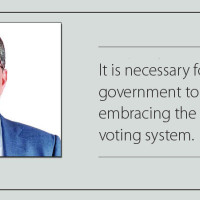- Wednesday, 11 February 2026
Money Laundering And Kleptocrats
In Nepal cooperative loot, frauds and forgeries in which politicians and political functionaries of all hues and stripes are indulged can be said to be a kind of kleptocracy. Kleptocracy has been generally used to signify the ill-gotten wealth stashed away in the foreign banks or invested in the shady deals. In Nepal from the time of monarchy to these days of republican era rulers, political leaders are accused of having looted and siphoned off the illicit wealth to foreign banks to execute opaque transaction and shady financial deals, though there is no any corroborated or confirmed basis to these speculative accusations. Even as there may be cases of kleptocrats hiding their wealth in the banks or involved in shady financial deals overseas, such stances should be very few and limited compared to the countries in Africa, former Soviet republics and so on.
Kleptocracy has been widely interrogated and discussed in the reports brought out by Transparency International and many other organisations working in the area of justice, freedom and governance. Nepal’s cooperative sector scam characterised by fraudulent enrichment is also liable to figure in such transnational organisation’s reports. The widely circulated publication brought out by US National Endowment for Democracy (NED) named Journal of Democracy has recently included a well-researched article titled “The Rise of Kleptocracy: A challenge for Democracy. Contributed by Christopher Walker and Melissa Alen, it makes an interesting reading on the subject . This article plucks information from the said article considering its relevance in the context of Nepal.
Offshore finance
The term kleptocracy has come into common usage especially following the rise of offshore finance-enabled corruption at the national level to metastasise into a far more complex and vexing international problem. Today's kleptocrats launder their money overseas, storing it in settings where it is protected. Transparency International UK conservatively estimates that property worth ₤4.2 billion has been purchased with suspect funds in London alone. To purchase this high-end real estate, kleptocrats employ a cadre of bankers, accountants, real-estate agents, and lawyers to scrub their corrupt money. While many of the vehicles used to launder money are not illegal in the United States or the UK, members of these professions are required to report suspected cases of money laundering to the authorities. Instead, this requirement is frequently overlooked, skirted, or ignored, weakening the rule-of-law norms that are hallmarks of democracy.
Globalised kleptocrats have been able to embed themselves not only in the international financial system but also in the fabric of democratic societies, developing "sophisticated global networks to launder their wealth and avoid international scrutiny. Kleptocrats, as mentioned in the aforesaid article, launder not just their wealth but also their reputations. In an interconnected world of omnipresent and investigative media, it is difficult to hide and conceal. The kleptocrats must operate more or less in the open. Yet they have devised ways to camouflage and shield their avaricious activities. Their toolkit includes securing multiple citizenships; hiring public-relations experts; and undertaking philanthropic activities that serve both to launder money through transnational networks.
The massive corruption evident in these cases is certainly about greed, but sometimes it also has a geostrategic dimension. Dictatorial regimes use corruption internationally to undermine democratic resolve and principles in established democracies. This is possible because "kleptocracy puts enormous resources at the government's disposal, to co-opt foreign business and political elites. Russian scholar Mark Galeotti, as quoted in the article, calls this phenomenon the "mobilisation state". Its essence is that "nothing is beyond regime’s reach; that anybody, any institution, from companies to criminal gangs, can be called on to carry out intended missions. This is, in effect, the weaponisation of kleptocracy.
Dictatorial regimes lavish with expensive gifts and extensive bribes to the powerful officials to polish their reputation. In 2017, members of the European Parliament demanded an investigation into what came to be known as the Laundromat, a "secret $2.9 billion slush fund" used to pay key figures in Europe to polish the reputation of a kleptocratic government of the former Soviet republic. Corruption poses a persistent challenge in most societies. But its scope and impact can be kept in check through a country's internal accountability and transparency mechanisms, including independent media, civil society, impartial courts, legislative oversight, and political opposition.
Sophisticated responses
Oftentimes it is found that Kleptocracy uses public institutions to enable a network of ruling elites to steal public funds for their own private gain. In such settings, internal checks on power are neutralised or co-opted. The state is captured by narrow interests who use the global financial system to launder and protect their ill-gotten gains. This international dimension of modern kleptocracy creates complex problems that require new and more sophisticated responses. As Carl Gershman has argued, "in the era of globalisation, kleptocracy represents an exceedingly dangerous threat to democracy. Well-resourced kleptocracies project their sophisticated corrupt practices beyond national borders with an ever-increasing impact felt in new and established democracies alike.
The well-resourced kleptocrats and the powerful networks that have been forged around them operate seamlessly across borders; any successful response must be able to do the same. Kleptocracy is therefore a global scourge. It cannot be defeated with a piecemeal approach that is confined to individual states. As emphasised by Walker and Allen, a coordinated effort from civil society, the legal and business communities, journalists, and law enforcement agencies is needed. Groups working to address challenge of kleptocracy are too often separated into professional, geographic, and linguistic silos. It is imperative to bring these groups together including the CSOs in Nepal; to encourage them to share and discuss methods, tactics, and lessons from their experiences; and to foster the growth of networks and alliances that will enhance their future efforts.
(Rijal, PhD, contributes regularly to TRN and writes on contemporary political, economic and governance issues. rijalmukti@gmail.com)
















